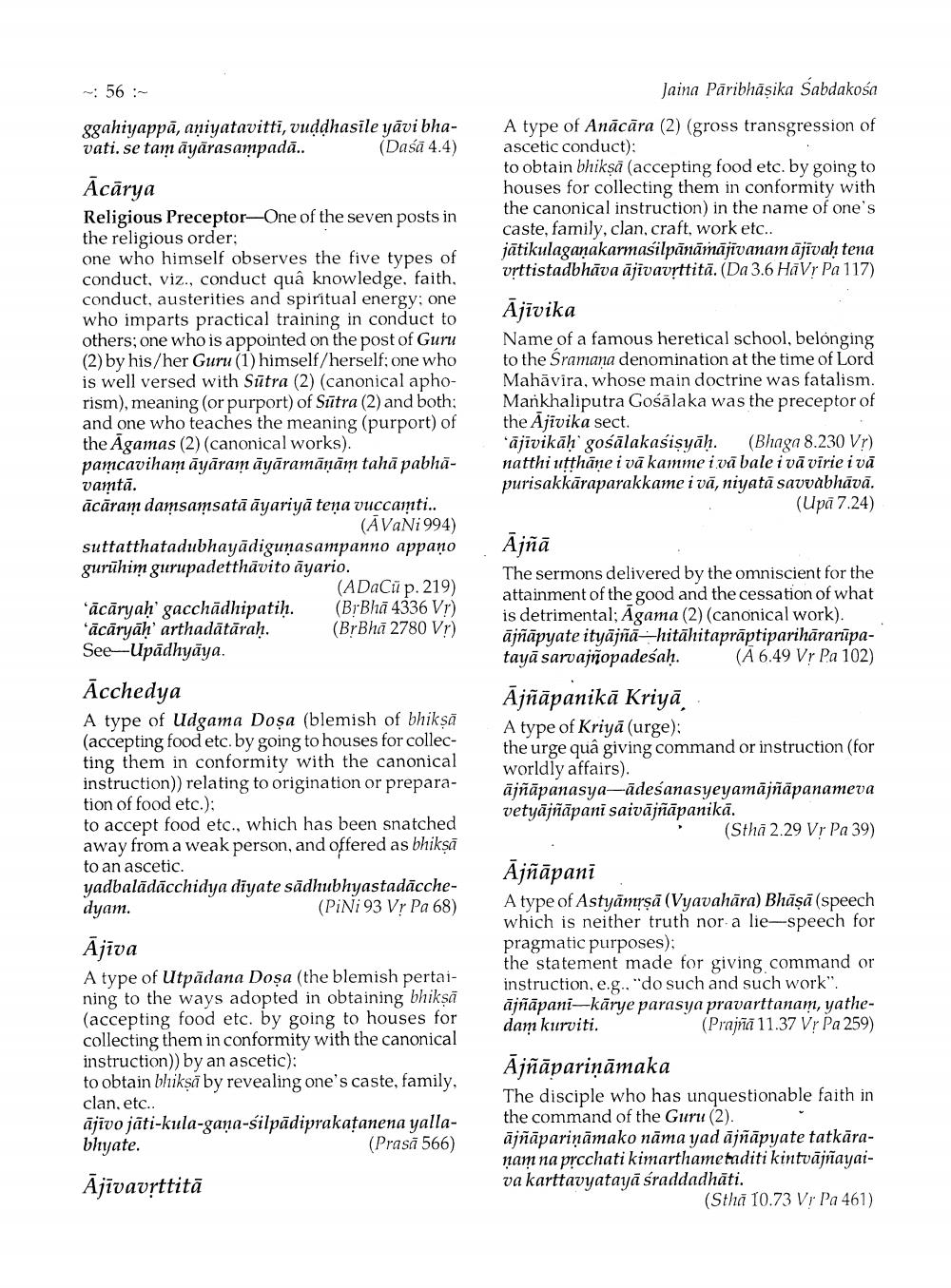________________
- 56 -
ggahiyappă, aniyatavitti, vuddhasile yāvi bhavati. se tam āyārasampadā.. (Daśā 4.4)
Jaina Pāribhāșika Sabdakosa A type of Anācāra (2) (gross transgression of ascetic conduct); to obtain bhikṣā (accepting food etc. by going to houses for collecting them in conformity with the canonical instruction) in the name of one's caste, family, clan, craft, work etc.. jātikulaganakarmasilpānāmājīvanam ājivah tena vrttistadbhāva ājīvavrttitā. (Da 3.6 HãV? Pa 117)
Ācārya Religious Preceptor-One of the seven posts in the religious order; one who himself observes the five types of conduct, viz., conduct quâ knowledge, faith, conduct, austerities and spiritual energy: one who imparts practical training in conduct to others; one who is appointed on the post of Guru (2) by his/her Guru (1) himself/herself; one who is well versed with Sūtra (2) (canonical aphorism), meaning (or purport) of Sūtra (2) and both; and one who teaches the meaning (purport) of the Agamas (2) (canonical works). pamcaviham āyāram āyāramāņām tahā pabhāvamtā. ācāram damsamsatā āyariyā teņa vuccanti..
(ĀVaNi 994) suttatthatadubhayādigunasampanno appaņo gurūhim gurupadetthāvito āyario.
(ADaCü p. 219) ‘ācāryah gacchädhipatiḥ. (BiBhā 4336 Vr) 'ācāryāḥ' arthadātāraḥ, (BrBhā 2780 V;) See-Upādhyāya.
Ajīvika Name of a famous heretical school, belonging to the Sramana denomination at the time of Lord Mahāvira, whose main doctrine was fatalism. Mankhaliputra Gośālaka was the preceptor of the Ājivika sect. 'ājīvikāh gośālakasisyāḥ. (Bhaga 8.230 Vr) natthi utthāne i vā kamme i vā bale i vā virie i vā purisakkāraparakkame i vã, niyatā savvabhāvā.
(Upā 7.24)
Acchedya A type of Udgama Dosa (blemish of bhikṣā (accepting food etc. by going to houses for collecting them in conformity with the canonical instruction)) relating to origination or preparation of food etc.); to accept food etc., which has been snatched away from a weak person, and offered as bhikṣā to an ascetic. yadbalādācchidya diyate sādhubhyastadācchedyam.
(PiNi 93 V; Pa 68)
Ājñā The sermons delivered by the omniscient for the attainment of the good and the cessation of what is detrimental; Agama (2) (canonical work). ājñāpyate ityājñā-hitāhitaprāptiparihāraripatayā sarvajñopadeśah. (A 6.49 Vr Pa 102)
(A 0.4 Ājñāpanikā Kriyā. A type of Kriyā (urge): the urge quâ giving command or instruction (for worldly affairs). ājñāpanasya-ādeśanasyeyamājñāpanameva vetyājñāpani saivājñāpanikā.
(Sthā 2.29 Vr Pa 39)
Ājñāpani A type of Astyāmrşā (Vyavahāra) Bhāṣā (speech which is neither truth nor a lie-speech for pragmatic purposes); the statement made for giving command or instruction, e.g., "do such and such work". ājñāpani-kārye parasya pravarttanam, yathedam kurviti.
(Prajñā 11.37 V? Pa 259)
Ajiva A type of Utpādana Dosa (the blemish pertaining to the ways adopted in obtaining bhikṣā (accepting food etc. by going to houses for collecting them in conformity with the canonical instruction)) by an ascetic): to obtain bliikşi by revealing one's caste, family, clan, etc.. ājivo jāti-kula-gana-silpädiprakațanena yallabhyate.
(Prasa 566)
Ajñāpariņāmaka The disciple who has unquestionable faith in the command of the Guru (2). ājñāparināmako nāma ad ājñāpyate tatkāranam na prcchati kimarthametrditi kintvājnayaiva karttavyatayā sraddadhāti.
(Sthä 10.73 Vr Pa 461)
Ājīvavrttitā




